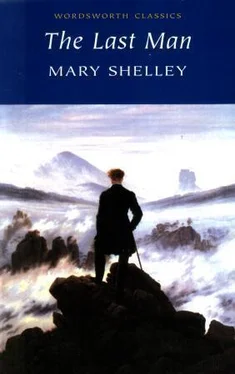Poverty was the cloud that veiled her excellencies, and all that was good in her seemed about to perish from want of the genial dew of affection. She had not even the same advantage as I in the recollection of her parents; she clung to me, her brother, as her only friend, but her alliance with me completed the distaste that her protectors felt for her; and every error was magnified by them into crimes. If she had been bred in that sphere of life to which by inheritance the delicate framework of her mind and person was adapted, she would have been the object almost of adoration, for her virtues were as eminent as her defects. All the genius that ennobled the blood of her father illustrated hers; a generous tide flowed in her veins; artifice, envy, or meanness, were at the antipodes of her nature; her countenance, when enlightened by amiable feeling, might have belonged to a queen of nations; her eyes were bright; her look fearless.
Although by our situation and dispositions we were almost equally cut off from the usual forms of social intercourse, we formed a strong contrast to each other. I always required the stimulants of companionship and applause. Perdita was all-sufficient to herself. Notwithstanding my lawless habits, my disposition was sociable, hers recluse. My life was spent among tangible realities, hers was a dream. I might be said even to love my enemies, since by exciting me they in a sort bestowed happiness upon me; Perdita almost disliked her friends, for they interfered with her visionary moods. All my feelings, even of exultation and triumph, were changed to bitterness, if unparticipated; Perdita, even in joy, fled to loneliness, and could go on from day to day, neither expressing her emotions, nor seeking a fellow-feeling in another mind. Nay, she could love and dwell with tenderness on the look and voice of her friend, while her demeanour expressed the coldest reserve. A sensation with her became a sentiment, and she never spoke until she had mingled her perceptions of outward objects with others which were the native growth of her own mind. She was like a fruitful soil that imbibed the airs and dews of heaven, and gave them forth again to light in loveliest forms of fruits and flowers; but then she was often dark and rugged as that soil, raked up, and new sown with unseen seed.
She dwelt in a cottage whose trim grass-plat sloped down to the waters of the lake of Ulswater; a beech wood stretched up the hill behind, and a purling brook gently falling from the acclivity ran through poplar-shaded banks into the lake. I lived with a farmer whose house was built higher up among the hills: a dark crag rose behind it, and, exposed to the north, the snow lay in its crevices the summer through. Before dawn I led my flock to the sheep-walks, and guarded them through the day. It was a life of toil; for rain and cold were more frequent than sunshine; but it was my pride to contemn the elements. My trusty dog watched the sheep as I slipped away to the rendezvous of my comrades, and thence to the accomplishment of our schemes. At noon we met again, and we threw away in contempt our peasant fare, as we built our fire-place and kindled the cheering blaze destined to cook the game stolen from the neighbouring preserves. Then came the tale of hair-breadth escapes, combats with dogs, ambush and flight, as gypsy-like we encompassed our pot. The search after a stray lamb, or the devices by which we elude or endeavoured to elude punishment, filled up the hours of afternoon; in the evening my flock went to its fold, and I to my sister.
It was seldom indeed that we escaped, to use an old-fashioned phrase, scot free. Our dainty fare was often exchanged for blows and imprisonment. Once, when thirteen years of age, I was sent for a month to the county jail. I came out, my morals unimproved, my hatred to my oppressors increased tenfold. Bread and water did not tame my blood, nor solitary confinement inspire me with gentle thoughts. I was angry, impatient, miserable; my only happy hours were those during which I devised schemes of revenge; these were perfected in my forced solitude, so that during the whole of the following season, and I was freed early in September, I never failed to provide excellent and plenteous fare for myself and my comrades. This was a glorious winter. The sharp frost and heavy snows tamed the animals, and kept the country gentlemen by their firesides; we got more game than we could eat, and my faithful dog grew sleek upon our refuse.
Thus years passed on; and years only added fresh love of freedom, and contempt for all that was not as wild and rude as myself. At the age of sixteen I had shot up in appearance to man’s estate; I was tall and athletic; I was practised to feats of strength, and inured to the inclemency of the elements. My skin was embrowned by the sun; my step was firm with conscious power. I feared no man, and loved none. In after life I looked back with wonder to what I then was; how utterly worthless I should have become if I had pursued my lawless career. My life was like that of an animal, and my mind was in danger of degenerating into that which informs brute nature. Until now, my savage habits had done me no radical mischief; my physical powers had grown up and flourished under their influence, and my mind, undergoing the same discipline, was imbued with all the hardy virtues. But now my boasted independence was daily instigating me to acts of tyranny, and freedom was becoming licentiousness. I stood on the brink of manhood; passions, strong as the trees of a forest, had already taken root within me, and were about to shadow with their noxious overgrowth, my path of life.
I panted for enterprises beyond my childish exploits, and formed distempered dreams of future action. I avoided my ancient comrades, and I soon lost them. They arrived at the age when they were sent to fulfil their destined situations in life; while I, an outcast, with none to lead or drive me forward, paused. The old began to point at me as an example, the young to wonder at me as a being distinct from themselves; I hated them, and began, last and worst degradation, to hate myself. I clung to my ferocious habits, yet half despised them; I continued my war against civilization, and yet entertained a wish to belong to it.
I revolved again and again all that I remembered my mother to have told me of my father’s former life; I contemplated the few relics I possessed belonging to him, which spoke of greater refinement than could be found among the mountain cottages; but nothing in all this served as a guide to lead me to another and pleasanter way of life. My father had been connected with nobles, but all I knew of such connection was subsequent neglect. The name of the king,—he to whom my dying father had addressed his latest prayers, and who had barbarously slighted them, was associated only with the ideas of unkindness, injustice, and consequent resentment. I was born for something greater than I was—and greater I would become; but greatness, at least to my distorted perceptions, was no necessary associate of goodness, and my wild thoughts were unchecked by moral considerations when they rioted in dreams of distinction. Thus I stood upon a pinnacle, a sea of evil rolled at my feet; I was about to precipitate myself into it, and rush like a torrent over all obstructions to the object of my wishes—when a stranger influence came over the current of my fortunes, and changed their boisterous course to what was in comparison like the gentle meanderings of a meadow-encircling streamlet.
I lived far from the busy haunts of men, and the rumour of wars or political changes came worn to a mere sound, to our mountain abodes. England had been the scene of momentous struggles, during my early boyhood. In the year 2073, the last of its kings, the ancient friend of my father, had abdicated in compliance with the gentle force of the remonstrances of his subjects, and a republic was instituted. Large estates were secured to the dethroned monarch and his family; he received the title of Earl of Windsor, and Windsor Castle, an ancient royalty, with its wide demesnes were a part of his allotted wealth. He died soon after, leaving two children, a son and a daughter.
Читать дальше












